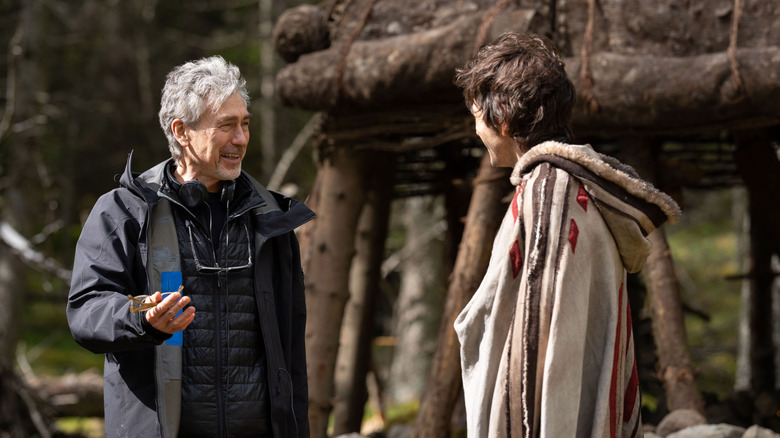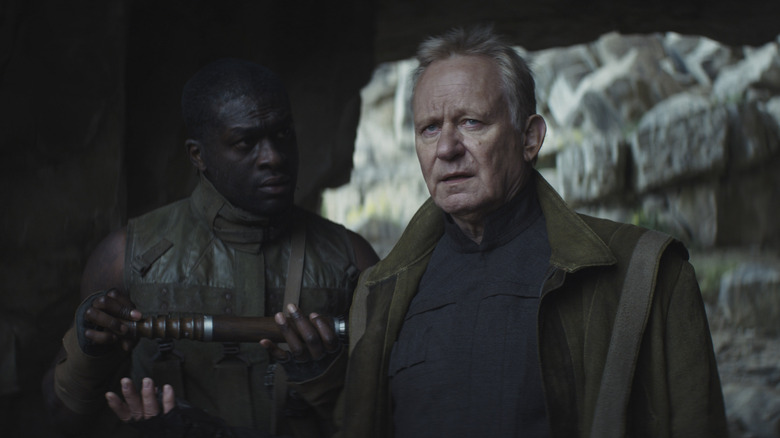Andor Showrunner Tony Gilroy On The Season 1 Finale, What's Ahead For Cassian & More [Exclusive Interview]
Well, we've made it, "Star Wars" fans. The first season of "Andor" is in the books, and to the surprise of many, it now ranks as one of the greatest things to come along in a galaxy far, far away. Sure, the show had promise in the beginning, but it is hard to imagine that any hardcore fans (such as myself) ever imagined loving this show as much as they do now. But "Andor" proved itself to be great, and there is much to discuss as we begin the wait for season 2. Fortunately, we've got some insight from the man responsible for the show, Tony Gilroy.
Originally making himself known to the franchise as a writer who helped oversee reshoots on "Rogue One: A Star Wars Story," Gilroy returned to the fold to tell the tale of Diego Luna's Cassian Andor before the events of that film. More to the point, Gilroy is telling us the gritty tale of the Rebellion's formation in a way we've never seen before, not to mention the depths of the ugliness of the Empire. This show has offered a lot of insight into the galaxy, and much more is coming in the second season, which is just now getting underway.
I had the good fortune of speaking with Gilroy on /Film's behalf leading up to the "Andor" season 1 finale that's now available on Disney+. We discussed what to expect from the second season, the importance of that post-credits scene, the fate of Andy Serkis' Kino Loy, and much more.
This interview contains massive spoilers for the first season of "Andor," and it has been lightly edited for clarity and brevity.
'The show is in the kitchen and not in the restaurant'
I've loved "Star Wars" my whole life. And beyond "Star Wars," Episode 10 of the show, "One Way Out," is now one of my favorite episodes of television of all time. I just have to straight-up thank you for making that exist.
You've got to stop watching television now. You should just quit with that and don't watch anything else. Stay there. Stay right there [laughs]. Thank you very much. Thank you. Thank you, thank you, thank you.
I did watch it three times.
Wow.
I'm telling you, I was so struck by it. But a big part of it is that Andy Serkis shows up, and we don't know he's going to show up. Then he delivers an Emmy-worthy performance. It was a really nice surprise. So I guess the first question I'd have is, this show doesn't really lend itself to cameos, so as you're moving into season 2, can we expect maybe some more actors we'd love who show up that we don't yet know about?
Yeah, I would say yes. We start shooting on Monday and this second half will be walking us, I've said it before, our final scene will be walking you into the first scene of "Rogue One." As we get there, we have some things we have to do and some people we have to meet, yeah.
In the finale, this is maybe the most violent "Star Wars" has ever been, at least in some close-up, intimate way. Was there any pushback on that level of violence, that very focused level of violence that you guys end up approaching in that final episode?
We're mindful. It obviously passed muster, because we do hear from Standards and Practices. Look man, you go back, and [there's Anakin] crawling out of the lava and going into the bacta bath [in "Revenge of the Sith]. There's a threshold. I don't think we could go much farther beyond this, but we made sure what we were doing. We let everybody know what we were doing. Within the rules as they are described to us, we're playing within the lines. I think, perhaps, it has something to do with the fact that it's people that you care about and people that you know about. Screen violence takes on an extra dimension when you're really emotionally plugged into the characters.
I think what's interesting is that so many of these characters, they're not like the Hans, the Lukes, the Leias of the world. These are not heroes that are bathed in glory later on. These are what I would label as nameless heroes. These are people that the Rebellion was built on that most people are never going to hear about. I think that's a big part of the reason why it works so well for people who have been with "Star Wars" for so long.
Well, you've just enunciated exactly what our show is trying to be about. It's the gravel on which the road is built. Every movement is like that in history. You saw in Luthen's speech and he called himself on it. "I'm trying to build a sunrise that I may never see." People caught up in events that inspire them and push them beyond their own conceivable aspirations of what they might do. That's true heroism in a way, isn't it? That's what we're interested in. The show is in the kitchen and not in the restaurant. These are all the people behind the scenes.
'The job is to be responsible for everything'
You mentioned you start filming the second season on Monday. How involved are you in season 2? Are you directing a few episodes? How much are you going to be on the ground for this new season?
I'm here. I'm doing what I did. I'm doing exactly what I did last season. It sounds weird, but I'm literally too busy to direct. The showrunner job, it's like you're directing the directors. You're directing everything. There's two directors here now, and one starts shooting on Monday, and one is prepping for February. There's just an incredible amount of things that need to be done all the time. My time is better served doing other things. Also, the show is better served by having directors who come in who are really ambitious, and greedy, and want to push it past the point that I might take it. They're doing a better job than I would.
Well, I will say, as you're steering the ship, whatever you're doing, it's working.
But that's the job. The job is to be responsible for everything. Every music cue, every actor, everything. I'm all over the place. But on the set, it's their set. By the time we get there, we've talked over every minute of every moment of every scene.
One of the biggest things in "Star Wars" is that the "Star Wars" music sounds like "Star Wars" music. You know when you're hearing "Star Wars" music. One of the things I loved so much about that finale is there's the procession sequence and the people in the town are actually playing that music. But it sounds like "Star Wars" even though it's in the world. Can you talk a little bit about how you went about composing that bit of music or how that came about? Because I just thought that was so awesome and so perfect.
Nick Britell, it's the first thing that Nick and I did. We did it before we started shooting. We were in pre-production and we had just hired Nick, and I just started to get to know Nick. I said, "Look man, I need a couple things. We need some clanging banging that makes sense. We need to make this music for Ferrix that's the street music. Then we have to have this funeral music and it's about eight minutes of diegetic music, and we need to build it. I want it really played. I want it to be amateur, and I want it to be aspirational. I want it to be a civic experience." We started building that together. That was the first thing that we did.
It is really difficult. It's very difficult to figure out what is the music on the ground in "Star Wars." What do you put in behind the party? What is the source music? This was our attempt to be somewhat terrestrial and to have something that hopefully could only exist in Ferrix. It was a real, total collaboration. Then we didn't see each other for six months. Then we went off and shot all this stuff, then we came back, and then we had to score. But that's the very first thing that we did.
'All roads are ultimately leading to Rogue One'
Going back to the season 2 of it all, obviously we leave off in a pretty interesting place. Is the next episode going to be like episode 13 or is it going to be more like season 2, episode 1? Are we in for a pretty different type of show in season 2, or is it pretty much just going to be the same trajectory?
Well, it's going to be the same tone. It's going to be hopefully the same quality, the same attention to detail, and all the rest of the things that people got used to. But there's two things that are very distinctively different. One is that this is a show about [Cassian] becoming a revolutionary. His commitment to the cause is not going to be that much in doubt over the next four years. That's the second difference. We're going to be covering four years. Every time we do three episodes in the second half, we jump ahead a year. When we come back to the show for part two, it'll be a year later. We'll do three episodes, and then we'll jump a year. Then we'll do three episodes, and then we'll jump a year on that. That last year will be the year that takes us into "Rogue [One]." We have some pretty interesting storytelling opportunities. I'd be curious if anybody else has ever done it before. We can't think of a [show] where someone did that.
The show still is about becoming, and it's about people, or as you say, ordinary people making extremely difficult decisions under extreme circumstances. That won't change. But it's really more about thematically how the Rebellion will come together, and the difficulties of the Rebellion coming together. We know it's going to end up with the Alliance in Yavin. Well, that's not a very easy process. Revolutions are typically formed by all kinds of factions, and all kinds of attitudes. And what happens to the original gangsters along the way? What happens to the outliers? What happens to the people who play it too safe? It's going to be about the revolution coming together, and the Alliance coming together, and the way that Cassian himself had to come together on the first half.
You can just say yes or no, or you can just tell me to f*** off, but is Kino Loy dead?
We didn't see him die.
I loved him so much. I just need to know. But I'll take that. The last thing is, we have a bit of a post-credits scene. We finally see the Death Star being built. How much of a bearing is that post-credits scene going to have on season 2?
Well, where is he going? By the end, the first scene of "Rogue [One]" is him going off to go to the Rings of Kafrene to try to chase down the rumor about this thing. What does Tivik say to him, man? "There's a weapon." They're building a weapon. What kind of weapon? A planet killer. All roads lead to that scene. Now, that's not entirely what our show is going to be about. People don't know the existence of it, do they? Some people do. Krennic does. The people in the ISB. Very few of them might. But all roads are ultimately leading to "Rogue One."
The first season of "Andor" 1 is now streaming on Disney+.



